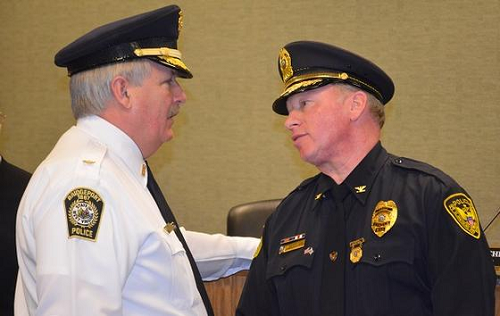New Drug Task Force "Solid," Looking to Make Progress against Old Geographic, Economic Foes
By Jeff Toquinto on April 06, 2013 via Connect-Bridgeport.com
United States Attorney William J. Ihlenfeld, II’s job focuses on issues relating to justice that range from embezzlement and tax fraud to major cases with the trafficking and selling of drugs. What Ihlenfeld is also finding out is that his job also includes a focus on geography. And it’s geography that has helped create a drug problem here in Bridgeport, Harrison County and other parts of West Virginia.
While the crossing of Interstate 79 and U.S. Route 50 is certainly a boon on the economic front, it’s always proven to be a drug traffickers road of opportunity..png)
.png)
“When you have a major highway like I-79 it presents the unfortunate opportunity to transport drugs in a much easier manner from one community to the next,” said Ihlenfeld. “It allows drug traffickers to go from Pittsburgh or other larger areas to have access into West Virginia and set up shop so to speak and traffic drugs in areas where they can do better with less competition.
“This isn’t unique to this area. We see it in other parts of the Northern District,” he continued. “You see it on I-70 in the northern panhandle.”
It’s the availability of drugs in the area and the occasional ease in which they are brought to the local market that makes the job of the recently reconfigured Greater Harrison County Drug and Violent Crimes Task Force that much more important. In December, after the Harrison County Sheriff’s Department opted to drop out of the group, Bridgeport and Clarksburg’s police departments met with Ihlenfeld and the new group came to being.
Unlike the past group, the new group has representation from multiple local, state and federal agencies. The board consists of Ihlenfeld, Bridgeport Police Chief John Walker, Clarksburg Police Chief Marshall Goff, DEA Supervisor Albert Galietti, State Police Bureau of Criminal Investigations Captain Tim Bledsoe, ATF Agent in Charge Dewayne Haddix and U.S. Marshal Gary Gaskins. Recently, the U.S. Postal Service Inspections wing came on board.
The group’s board oversees the operations, but the actual work is done in the field by officers. Two Bridgeport officers, three from Clarksburg, a State Police member and a DEA agent area also part of the group.
Walker, who was unanimously voted chairman of the new board, is pleased with the cooperation the group has had in the ongoing and often frustrating battle against drugs.
“Things are going very well and it's been solid. All the agencies that are on board are working hand in hand. They feed information back and forth to each other and we’re benefitting from a lot of inter-agency cooperation,” Walker said.
Ihlenfeld echoed Walker’s comments.

“(Things are going) very well. The coordination and the cooperation is better than ever with this group,” the Attorney said. “We obviously have added additional resources since last year with the State Police and the DEA having a full-time presence dedicated to the Task Force. It’s all working very well.”
One of the fears by members of the public was that there would be a lapse in operations in late 2012 and into 2013 when the old Task Force became the new one. Walker said that situation never took place.
“We continued to work right through the period,” Walker said. “There wasn’t a 24-hour period, or even a minute, when we were not operational.”
That situation likely bodes well for Bridgeport, Clarksburg, Harrison County and the entire region. As much as geography is a key part in this area’s drug problems, so too is the economic factor. For those dealing drugs, a place such as North Central West Virginia is an area where a huge profit can be turned.
“We see it throughout our district. A pill, say hydrocodone, will likely go for more in this part of West Virginia that in Columbus, Ohio or Pittsburg or Detroit,” Ihlenfeld said. “Our own citizens will travel to Detroit to acquire a bunch of 30 milligram pills that they pay $15 each for and come back here and sell it for $30.
“There’s more people interested in purchasing drugs in large cities and bringing it here because of the profit,” he continued. “Sometimes the profit is a $5 mark up and sometimes it’s a very high dollar markup. There’s more of a supply in the bigger cities than there is here so the law of supply and demand, unfortunately, works in the drug world as well.”
Ihlenfeld said he is working with Walker and others on doing a better job of interdicting drugs coming through the roadways. To do that, he said, the goal is to find a better way to work in an even closer manner with law enforcement, particularly State Troopers, on a way to make that happen.
“The uniformed State Police Troopers are out there every day and we’re working with them on a communication method that will make interdiction a more integral part of their patrols,” Ihlenfeld said. “Right now, that’s a very large focus of what we want to do to make an impact.”
Walker is hopeful that method, and others, will work. He believes that the commitment of the new Task Force makes the possibility of a bigger impact on the war on drugs real.
“We’ve taken this to another level. It’s better that I would have hoped for. Honestly, if I could have changed anything, it would have been bringing in the extra agencies to be more involved much earlier,” Walker said.
Editor's Note: Top photo shows United States Attorney William J. Ihlenfeld, II at a recent press conference addressing the crowd surrouned by, from left, Bridgeport Council Member Bob Greer, Mayor Jim Christie and Police Chief John Walker. Bottom photo shows two Task Force board members Walker, left, and Clarksburg Police Chief Marshall Goff.

